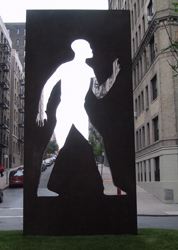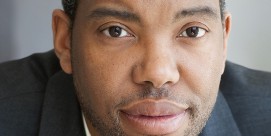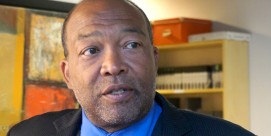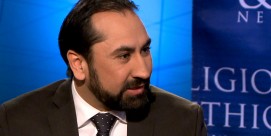Gary Dorrien: Visible Man Rising
By the time The Speech of August 28, 2008 ended with an artful allusion to the March on Washington of August 28, 1963, the Democratic Convention had belatedly made a case for ending the rule of the Republicans. By then Barack Obama also knew that he had won his medium-sized convention gamble.
The only thing that didn’t go right was losing the day-after media attention to John McCain’s stunningly desperate gamble. It didn’t rain in Denver, and after an outpouring of predictions that Obama would appear physically diminished at Invesco Field, or look egotistically inflated at his Greek temple, or prove unable to hold the attention of a stadium audience, he gave a sensational speech watched by 40 million viewers that looked as impressive as it sounded.
Obama worked a typical Obama theme, this time calling it “the American Promise” of opportunity and responsibility for all, but he was tougher and more specific than much of his previous campaign rhetoric. Stressing the struggles of working people, he called for tax cuts for the non-rich and higher taxes on corporations that ship jobs overseas. He made a strong case for strengthening the middle class, investing in renewable energy, universalizing health coverage, and repairing America’s international image. He amplified Bill Clinton’s skillful summary of the current miserable economic situation and John Kerry’s forceful summary of John McCain’s retreat to Republican establishment orthodoxy. With perfect pitch for the occasion, he stressed his differences with McCain and gave a clear picture of what an Obama presidency would be about.
Except that an Obama presidency would also represent something magnificent that the Obama convention played down during prime time. The very thing that made this convention historic was the last thing Obama wanted to be talked about from the podium during prime time.
Convention appearances and a great deal of journalism to the contrary, Obama does not believe the moment has arrived for “post-racial politics,” and he explicitly denies he is a symbol or champion of it. His favorite image of how we should think about racial justice is a split screen that holds in view the just, multiracial society that must be created and the reality of an America that is not a just society. You cannot move “beyond race” in the political sphere in a society where race remains a terribly significant marker of social privilege and discrimination.
Obama was a civil rights lawyer, and as a law professor he specialized in civil rights. He understands acutely that we still need civil rights lawyers because racial discrimination is still pervasive in the United States. His very argument for not rubbing the noses of white Americans in the history and reality of white racism is that the problem is too entrenched in white attitudes and social structures to be remedied by race-specific policies or by any appeal to white guilt. As Obama explains in THE AUDACITY OF HOPE, “Rightly or wrongly, white guilt has largely exhausted itself in America; even the most fair-minded of whites, those who would genuinely like to see racial inequality ended and poverty relieved, tend to push back against suggestions of racial victimization — or race-specific claims based on the history of race discrimination in this country.”
Since even the most fair-minded whites have a low threshold for anything smacking of black grievance, better not go there in a political campaign. Better not evoke the civil rights movement in prime time at the convention. And better not let on that you understand the racial subtext of the constant accusation that you are an “elitist,” a stand-in term for “arrogant,” a proud type with overweening self-regard, which calls up centuries of needing to put down the “uppity” blacks who dared to defend themselves and their families.
In A BOUND MAN: WHY WE ARE EXCITED ABOUT OBAMA AND WHY HE CAN’T WIN (Free Press, 2007), published last year, Shelby Steele says Obama cannot succeed because he is caught in the historic double bind between African American bargainers and challengers. Bargainers bargain for acceptance in white America by not presuming that white Americans are racist, while challengers challenge white Americans to prove themselves innocent of racism. Bill Cosby, Colin Powell, and Oprah Winfrey are bargainers, in this telling, while Al Sharpton and Jesse Jackson are challengers. Had Steele written his book a few months later, undoubtedly Jeremiah Wright would have played a larger role; he gets less than a page without being named.

Invisible Man memorial |
The bargainer/challenger debate takes place between and within the races, setting guilt-as-impotence against innocence-as-power, Steele argues. America needs to be delivered from this sorry either/or, which is why Obama has generated so much excitement. Steele, however, says Obama is too hopelessly bound by the social forces behind these categories to find a voice of his own. Obama is a racial cipher, not an actualized individual. He has a talent for inauthenticity that makes him good at fashioning a racial persona, which is not the same thing as achieving selfhood. According to Steele, Obama constantly negotiates the either/or in a vain attempt to grant racial innocence to white Americans at the same time that he withholds it from them. Thus, like the fictional Tod Clifton in Ralph Ellison’s INVISIBLE MAN, Obama has not achieved visibility as an individual. Since he lacks a real self, it is not clear that he has any real beliefs, much less that he would risk his life for any. Writing at the end of 2007, Steele contends that Obama would not be able to win the support of blacks and whites simultaneously. If he bargained zealously, he could not win black majorities; if he opted for challenge, making himself “black enough,” he had no chance of winning the nomination. Steele’s advice to Obama: give up what you’re doing in favor of finding out who you are.
In the category of turning a candidate’s strength into a weakness, Steele’s bestselling denigration of Obama’s personal character ranks with the Swift-boating of John Kerry’s military career in the 2004 election. How ridiculous can you get? The reflective, searching, complex, and sometimes painfully honest author of DREAMS FROM MY FATHER has no sense of self? His unprecedented march to the nomination was conducted by a cipher projecting the illusion of personhood? His very success at transcending the morality play of challengers versus bargainers proves he must be a fraud?
Steele is insightful in describing parts of his subject. He notes that challengers are granted distinct roles on special occasions to arbitrate who is racist and what racism looks like, and he rightly stresses that bargainers often have to hide their anger at whites for fear of wrecking the bargain. But his attack on Obama’s personal character is absurd, and his political forecast is not materializing. Obama is running close to 90 percent among African Americans, even as he pleads against racial “us” and “them” rhetoric and keeps racial justice talk out of convention prime time.
Obama supports affirmative action but prefers to talk about universal strategies — better schools, jobs that pay, and access to health care. On the campaign trail he stresses that in the past generation the African-American middle class has grown fourfold and the black poverty rate has been cut in half. Most blacks and Latinos, he argues, have already climbed into the middle class or are on their way, despite the barriers thrown in their way. The politics we need will help others get there. It will stress work and opportunity, making good on the American Promise. And it will not alienate the white working class voters of Michigan, Ohio, and Pennsylvania who are going to elect the next president.
We await polling data on how the Democratic Convention played in these election-in-their-hands states and elsewhere, but John McCain may have anticipated that it is going to play too well. On the day after the Democratic Convention, he undermined his chief argument against Obama — lack of relevant experience — by choosing the most inexperienced running mate ever selected by either party. McCain’s desperation should be a sign to nervous liberals of how very winnable this campaign is to elect Barack Obama as the 44th President of the United States.
–Gary Dorrien is the Reinhold Niebuhr Professor of Social Ethics at Union Theological Seminary and professor of religion at Columbia University.







